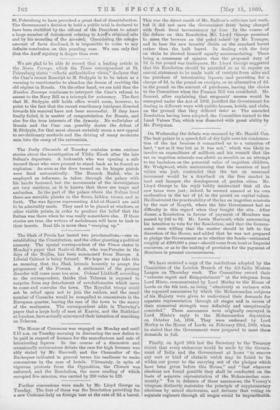On Wednesday the debate was resumed by Mr. Harold Cox.
The best points in a speech full of dry light were his condemna- tion of the . tax because it committed us to a valuation of land, " not as it was but as it was not," which was likely to involve an expenditure of millions, and his remark that the tax on ungotten minerals was about as sensible as an attempt to tax bachelors on the potential value of ungotten children. Mr. Wedgwood, while maintaining that the taxation of land values was just, contended that the tax on unearned increment would be a drawback on the free market in
land and hamper, development of garden cities. Mr. Lloyd George in is reply boldly maintained that all the new taxes were just ; indeed, he seemed amazed at his own moderation in the tax of id. in the pound on capital values. He illustrated the practicability of the tax on ungotten minerals by the case of Rosyth, where the late Government had no difficulty in this regard when they bought the site. After dinner, a Resolution in favour of payment of Members was passed by 242 to 92. Mr. Lewis Harcourt, while announcing his intention to vote for the Resolution, said that the Govern- ment were willing that the matter should be left to the discretion of the House, and added that he was not prepared to pledge the Government as to whether the funds—estimated roughly at £200,000 a year—should come from local or Imperial resources, or as to the making of provision for the payment of Members in present circumstances.










































 Previous page
Previous page